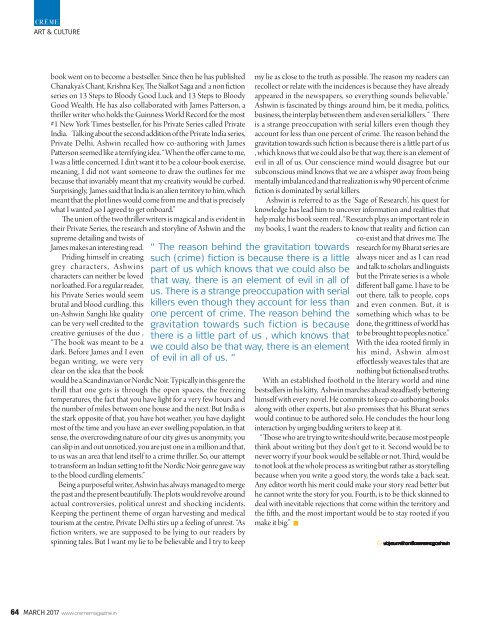Binder1 Inner_JRD
Create successful ePaper yourself
Turn your PDF publications into a flip-book with our unique Google optimized e-Paper software.
art & culture<br />
book went on to become a bestseller. Since then he has published<br />
Chanakya’s Chant, Krishna Key, The Sialkot Saga and a non fiction<br />
series on 13 Steps to Bloody Good Luck and 13 Steps to Bloody<br />
Good Wealth. He has also collaborated with James Patterson, a<br />
thriller writer who holds the Guinness World Record for the most<br />
#1 New York Times bestseller, for his Private Series called Private<br />
India. Talking about the second addition of the Private India series,<br />
Private Delhi, Ashwin recalled how co-authoring with James<br />
Patterson seemed like a terrifying idea. “When the offer came to me,<br />
I was a little concerned. I din’t want it to be a colour-book exercise,<br />
meaning, I did not want someone to draw the outlines for me<br />
because that invariably meant that my creativity would be curbed.<br />
Surprisingly, James said that India is an alien territory to him, which<br />
meant that the plot lines would come from me and that is precisely<br />
what I wanted ,so I agreed to get onboard.”<br />
The union of the two thriller writers is magical and is evident in<br />
their Private Series, the research and storyline of Ashwin and the<br />
supreme detailing and twists of<br />
James makes an interesting read.<br />
Priding himself in creating<br />
grey characters, Ashwins<br />
characters can neither be loved<br />
nor loathed. For a regular reader,<br />
his Private Series would seem<br />
brutal and blood curdling, this<br />
un-Ashwin Sanghi like quality<br />
can be very well credited to the<br />
creative geniuses of the duo ,<br />
“The book was meant to be a<br />
dark. Before James and I even<br />
began writing, we were very<br />
clear on the idea that the book<br />
would be a Scandinavian or Nordic Noir. Typically in this genre the<br />
thrill that one gets is through the open spaces, the freezing<br />
temperatures, the fact that you have light for a very few hours and<br />
the number of miles between one house and the next. But India is<br />
the stark opposite of that, you have hot weather, you have daylight<br />
most of the time and you have an ever swelling population, in that<br />
sense, the overcrowding nature of our city gives us anonymity, you<br />
can slip in and out unnoticed, you are just one in a million and that,<br />
to us was an area that lend itself to a crime thriller. So, our attempt<br />
to transform an Indian setting to fit the Nordic Noir genre gave way<br />
to the blood curdling elements.”<br />
Being a purposeful writer, Ashwin has always managed to merge<br />
the past and the present beautifully. The plots would revolve around<br />
actual controversies, political unrest and shocking incidents.<br />
Keeping the pertinent theme of organ harvesting and medical<br />
tourism at the centre, Private Delhi stirs up a feeling of unrest. “As<br />
fiction writers, we are supposed to be lying to our readers by<br />
spinning tales. But I want my lie to be believable and I try to keep<br />
“ The reason behind the gravitation towards<br />
such (crime) fiction is because there is a little<br />
part of us which knows that we could also be<br />
that way, there is an element of evil in all of<br />
us. There is a strange preoccupation with serial<br />
killers even though they account for less than<br />
one percent of crime. The reason behind the<br />
gravitation towards such fiction is because<br />
there is a little part of us , which knows that<br />
we could also be that way, there is an element<br />
of evil in all of us. “<br />
my lie as close to the truth as possible. The reason my readers can<br />
recollect or relate with the incidences is because they have already<br />
appeared in the newspapers, so everything sounds believable.”<br />
Ashwin is fascinated by things around him, be it media, politics,<br />
business, the interplay between them and even serial killers. “ There<br />
is a strange preoccupation with serial killers even though they<br />
account for less than one percent of crime. The reason behind the<br />
gravitation towards such fiction is because there is a little part of us<br />
, which knows that we could also be that way, there is an element of<br />
evil in all of us. Our conscience mind would disagree but our<br />
subconscious mind knows that we are a whisper away from being<br />
mentally imbalanced and that realization is why 90 percent of crime<br />
fiction is dominated by serial killers.<br />
Ashwin is referred to as the ‘Sage of Research’, his quest for<br />
knowledge has lead him to uncover information and realities that<br />
help make his book seem real. “Research plays an important role in<br />
my books, I want the readers to know that reality and fiction can<br />
co-exist and that drives me. The<br />
research for my Bharat series are<br />
always nicer and as I can read<br />
and talk to scholars and linguists<br />
but the Private series is a whole<br />
different ball game. I have to be<br />
out there, talk to people, cops<br />
and even conmen. But, it is<br />
something which whas to be<br />
done, the grittiness of world has<br />
to be brought to peoples notice.”<br />
With the idea rooted firmly in<br />
his mind, Ashwin almost<br />
effortlessly weaves tales that are<br />
nothing but fictionalised truths.<br />
With an established foothold in the literary world and nine<br />
bestsellers in his kitty, Ashwin marches ahead steadfastly bettering<br />
himself with every novel. He commits to keep co-authoring books<br />
along with other experts, but also promises that his Bharat series<br />
would continue to be authored solo. He concludes the hour long<br />
interaction by urging budding writers to keep at it.<br />
“Those who are trying to write should write, because most people<br />
think about writing but they don’t get to it. Second would be to<br />
never worry if your book would be sellable or not. Third, would be<br />
to not look at the whole process as writing but rather as storytelling<br />
because when you write a good story, the words take a back seat.<br />
Any editor worth his merit could make your story read better but<br />
he cannot write the story for you. Fourth, is to be thick skinned to<br />
deal with inevitable rejections that come within the territory and<br />
the fifth, and the most important would be to stay rooted if you<br />
make it big.”<br />
vidyaunnithan@crememagazine.in<br />
64 march 2017 www.crememagazine.in




